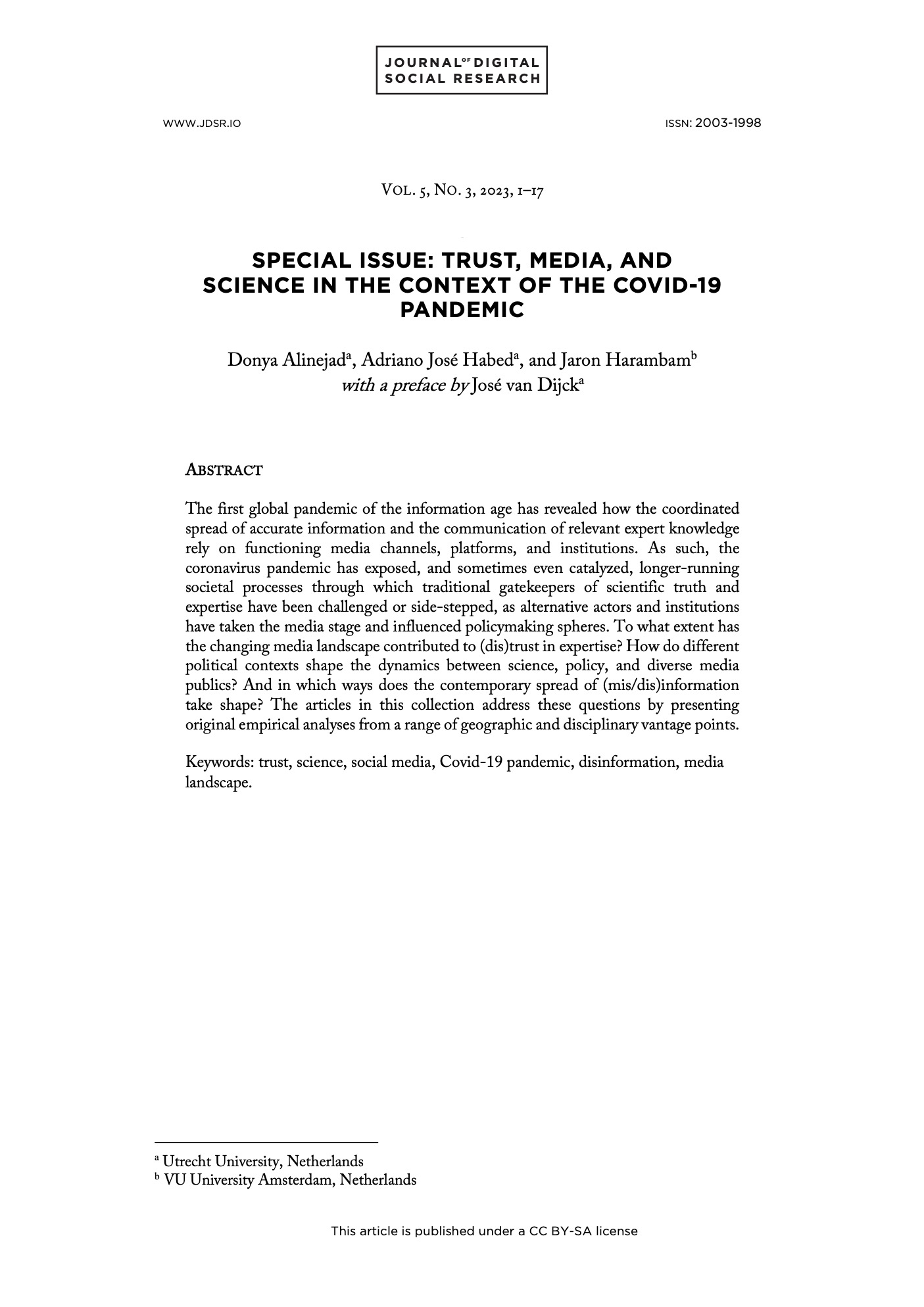Trust, media, and science in the context of the Covid-19 pandemic
DOI:
https://doi.org/10.33621/jdsr.v5i3.195Keywords:
trust, science, social media, Covid-19 pandemic, disinformation, media landscapeAbstract
The first global pandemic of the information age has revealed how the coordinated spread of accurate information and the communication of relevant expert knowledge rely on functioning media channels, platforms, and institutions. As such, the coronavirus pandemic has exposed, and sometimes even catalyzed, longer-running societal processes through which traditional gatekeepers of scientific truth and expertise have been challenged or side-stepped, as alternative actors and institutions have taken the media stage and influenced policymaking spheres. To what extent has the changing media landscape contributed to (dis)trust in expertise? How do different political contexts shape the dynamics between science, policy, and diverse media publics? And in which ways does the contemporary spread of (mis/dis)information take shape? The articles in this collection address these questions by presenting original empirical analyses from a range of geographic and disciplinary vantage points.
References
Alinejad, D., & Van Dijck, J. (2023). Climate communication: How researchers navigate between scientific truth and media publics. Communication and the Public, 8(1), 29-44.
Bennett, W. L., & Livingston, S. (2018). The disinformation order: Disruptive communication and the decline of democratic institutions. European journal of communication, 33(2), 122-139.
Bucher, H.-J. (2019). 3. The contribution of media studies to the understanding of science communication. In A. Leßmöllmann, M. Dascal, & T. Gloning (Eds.), Science Communication (pp. 51–76). De Gruyter. https://doi.org/10.1515/9783110255522-003
Cotter, K., DeCook, J. R., & Kanthawala, S. (2022). Fact-Checking the Crisis: COVID-19, Infodemics, and the Platformization of Truth. Social Media + Society, 8(1), 205630512110690. https://doi.org/10.1177/20563051211069048
Cunningham, S., & Craig, D. (2017). Being ‘really real’ on YouTube: Authenticity, community and brand culture in social media entertainment. Media International Australia, 164(1), 71–81. https://doi.org/10.1177/1329878X17709098
Deuze M. (2008). Corporate Appropriation of Participatory Culture. Newcastle upon Tyne, UK: Cambridge Sch. Publ.
Enli, G., & Rosenberg, L. T. (2018). Trust in the Age of Social Media: Populist Politicians Seem More Authentic. Social Media + Society, 4(1), 205630511876443. https://doi.org/10.1177/2056305118764430
Feinstein, N. W. (2015). Education, communication, and science in the public sphere. Journal of Research in Science Teaching, 52(2), 145-163.
Flew, T. (2021). The Global Trust Deficit Disorder: A Communications Perspective on Trust in the Time of Global Pandemics. Journal of Communication, 71(2), 163–186. https://doi.org/10.1093/joc/jqab006
Franzen, & P. Weingart (2011) The Sciences. Weingart (2011) 10.1093/joc/jqab006r: A Communications Persp (Vol. 28, pp. 3ingar Springer Netherlands.
Gauchat, G. (2011). The cultural authority of science: Public trust and acceptance of organized science. Public understanding of science, 20(6), 751-770.
Gillespie, T. (2018). Custodians of the internet: Platforms, content moderation, and the hidden decisions that shape social media. Yale University Press.
Harambam, J. (2020). The corona truth wars: Where have all the STS'ers gone when we need them most?. Science and Technology Studies, 33(4), 60-67.
Harambam, J. (2021). Against modernist illusions: why we need more democratic and constructivist alternatives to debunking conspiracy theories. Journal for Cultural Research, 25(1), 104-122.
Harambam, J., & Aupers, S. (2015). Contesting epistemic authority: Conspiracy theories on the boundaries of science. Public understanding of science, 24(4), 466-480.
Kaiser, J., & Puschmann, C. (2017). Alliance of antagonism: Counterpublics and polarization in online climate change communication. Communication and the Public, 2(4), 371ation antps://doi.org/10.1177/2057047317732350
Marres, N. (2015). Why Map Issues? On Controversy Analysis as a Digital Method. Science, Technology, & Human Values, 40(5), 655 Techn
Marres, N. (2018). Why we can't have our facts back. Engaging Science, Technology, and Society, 4, 423-443.
Melo-Mart.cience, TechnologyThe fight against doubt: How to bridge the gap between scientists and the public. Oxford University Press.
Murdock, G. (2021). Public Service Media for Critical Times: Connectivity, Climate, and Corona. In C. Fuchs & K. Unterberger (Eds.), The Public Service Media and Public Service Internet Manifesto (pp. 69ic Service Media and Public Service Inte
Pielke, Jr, R. A. (2007). The Honest Broker: Making Sense of Science in Policy and Politics (1st ed.). Cambridge University Press.
Roedema, T., Rerimassie, V., Broerse, J. E. W., & Kupper, J. F. H. (2022). Towards the reflective science communication practitioner. Journal of Science Communication, 21(4), A02.
Schäfer MT. (2011). Bastard Culture! How User Participation Transforms Cultural Production: Amsterdam: Amsterdam Univ. Press
Treen KMd’I, Williams HT, O'Neill SJ. 2020. Online misinformation about climate change. WIREs Clim. Change 11:e665
Van Dijck, J., & Alinejad, D. (2020). Social media and trust in scientific expertise: Debating the Covid-19 pandemic in the Netherlands. Social Media+ Society, 6(4), 2056305120981057.
Van Dijck, J, & Poell, T (2013). Understanding Social Media Logic, Media and Communication (No. 2–14; pp. 2–14). https://doi.org/10.12924/mac2013.01010002
Van Dijck J, Poell T, De Waal M. 2018. The Platform Society: Public Values in a Connective World: Oxford Univ. Press
Weingart, P. (1999). Scientific expertise and political accountability: Paradoxes of science in politics. Science and Public Policy, 26(3), 151–161. https://doi.org/10.3152/147154399781782437
Weingart, P., Guenther, L. (2016). Science Communication and the Issue of Trust, JCOM. 15(5) C01.

Downloads
Published
Issue
Section
License
Copyright (c) 2023 Donya Alinejad, Adriano José Habed, Jaron Harambam, José van Dijck

This work is licensed under a Creative Commons Attribution-ShareAlike 4.0 International License.



